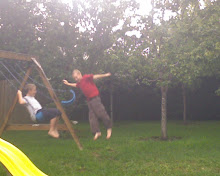Q: How genetic are we talking? If I’m related to Brooke, do I need to worry about my kids or grandkids getting HSP? Or, did I give it to her?
A: There are few different ways of genetically transmitting the disease, but from what I have seen, both in my research and the people I’ve met, it’s either really prevalent in a family, or practically unheard of. Everyone I’ve heard of and everyone I’ve met with HSP is either like me, where they’re the only ones in their family that the know of with it, or they are the other type, and their mother, 2 sisters, cousin, son, daughter, and 2 of their dogs also have HSP. (I actually know 2 families for which I didn’t really exaggerate much there.)
Since there is no one in our family who has had this disease prior to me, that I know of, my research shows and my honest belief is that it’s really rare in our family. It will probably be many, many generations until this shows up again, if then. This section from an HSP website describes it better than I can…….
How can it be HSP when no one else in the family has it?
“There are many explanations for why individuals who have all the signs and symptoms of HSP do not appear to have a family history of the disorder. The most common reason is that the condition may be recessive or X-linked. These forms may have passed down silently for generations until the correct circumstances existed for someone to have the disorder.
“Even someone with a dominant form of HSP may not appear to have a family history of the disorder. Since HSP can vary greatly in severity of symptoms and age of onset, a parent may have had a very mild case. His or her symptoms may have gone unnoticed or been attributed to other problems such as old age or arthritis. In addition, since symptoms can develop later in life, the person may have died before showing symptoms, or if still living, may not have developed them yet. Finally, it could be a new gene mutation, making the affected person the first in his family. “
Alaska to California: The last chapter
6 years ago



No comments:
Post a Comment